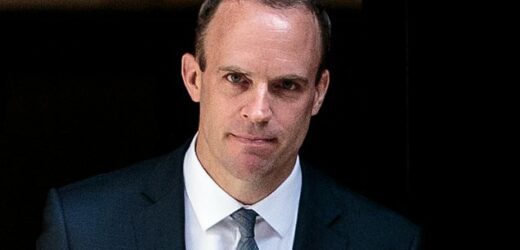Dominic Raab’s exit from Government over bullying row ‘sounds the death knell’ for his Bill of Rights as Rishi Sunak ‘scraps plans for overhaul of Labour’s Human Rights Act’
- Ministry of Justice says it is ‘looking carefully’ at the proposed legislation
Dominc Raab’s exit from Government over a bullying row will lead to the scrapping of his planned Bill of Rights, it has been claimed.
The former justice secretary had been working on an overhaul of Labour’s Human Rights Act before he resigned last month when a report found he bullied officials.
His departure from Cabinet has cleared the way for Rishi Sunak to ditch the Bill of Rights as the Prime Minister focuses on getting other legislation through Parliament.
Plans for a Bill of Rights to replace the 1998 Human Rights Act have long been promised by the Tories but have frequently been delayed.
Mr Raab’s own plans have twice been scrapped previously, but then been revived.
The Ministry of Justice said Alex Chalk, who replaced Mr Raab as Justice Secretary, is currently ‘looking carefully’ at the legislation before setting out his plans.
Dominic Raab had been working on an overhaul of Labour’s Human Rights Act before he resigned last month when a report found he bullied officials
Mr Raab’s departure from Cabinet has cleared the way for Rishi Sunak to ditch the Bill of Rights as the Prime Minister focuses on getting other legislation through Parliament
A Government source told The Times that Mr Raab’s departure ‘sounded the death knell’ for the Bill of Rights.
‘It won’t be coming back, or at least not in any form that resembles the current bill,’ they added.
Another Government source described the Bill as a ‘complete mess’ and said there was a ‘mountain’ of other legislation the Mr Sunak needs to get through Parliament.
The newspaper reported that three options were being considered, including carrying on with the Bill unchanged, altering the legislation to make it less complicated, or dtiching it entirely.
Government sources told The Times that scrapping the Bill was the most likely, although elements of it are likely to be repurposed in other legislation.
The Bill of Rights seeks to assert that British courts do not always need to follow case law from the European Court of Human Rights in Strasbourg.
It also strives to put London’s Supreme Court as the ultimate decision-maker on human rights issues.
Mr Raab previously told MPs the Bill would ‘restore a healthy dose of common sense’ to Britain’s justice system.
David Cameron promised a ‘British bill of rights’ before the 2010 general election, but the plans were downgraded when the Tories ended up in coalition government with the Liberal Democrats.
After the Conservatives won a majority at the 2015 general election, Mr Raab – as a justice minister – produced a green paper on a UK Bill of Rights for Mr Cameron but the plans were delayed by the EU referendum.
Theresa May put off an overhaul of the Human Rights Act while she dealt with Brexit, but Boris Johnson revived the plans after winning the 2019 general election.
Mr Raab, as justice secretary, unveiled the long-awaited package of measures in June last year.
But he then saw his Bill of Rights halted when Liz Truss replaced Mr Johnson as PM and sacked Mr Raab from his role.
Mr Sunak reappointed Mr Raab as justice secretary and deputy PM after replacing Ms Truss in October, which allowed him to resume his work on the Bill of Rights.
Mr Raab resigned from Government last month after an independent months-long probe by Adam Tolley KC upheld two of eight complaints against him over alleged bullying of civil servants.
Following his exit from Cabinet, Mr Raab launched an astonishing attack on ‘activist’ civil servants who were attempting to ‘block’ the Government’s work, including over human rights reform.
But some Tories welcomed suggestions that the Bill of Rights was being scrapped after Mr Raab’s exit.
Sir Bob Neill, the Conservative chairman of House of Commons’ Justice Committee, said: ‘I think we frankly wasted time on this daft idea of a British Bill of Rights.
‘And that took up more bandwidth than was necessary and I hope that will quietly die a death because I don’t think that was a good idea.’
A Ministry of Justice spokesperson said: ‘The new Lord Chancellor is looking carefully at the full range of the department’s work before setting out plans in detail.’
Source: Read Full Article




